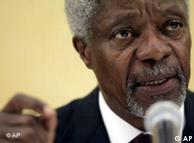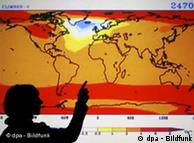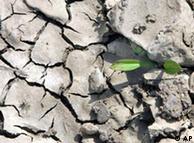A five-day conference in Geneva aims to provide politicians and other decision makers with the data they need to make informed decisions when it comes to climate change, according to members of the World Meteorological Organization (WMO), the technical and scientific arm of the United Nations, which is hosting the conference.
"Even if we reduce emissions of greenhouse gases, the climate will continue to change," Gro Harlem Brundtland, the United Nations secretary-general's special envoy on climate change, said on Monday. "All countries will need to adapt to a changing and more erratic climate."
But the problem is not a lack of dire warnings about more storms, rising sea levels, droughts, and famine, but how the information is used, according to WMO Secretary-General Michel Jarraud.
"The problem is that much information on the climate is not used properly," Jarraud told reporters. "It's time to link technology and science with decision makers."
Climate justice
 Annan said rich countries should make the biggest emissions cuts
Annan said rich countries should make the biggest emissions cuts
The conference comes before world leaders and delegates are set to meet in Copenhagen in December in an effort to agree on a binding deal that would curb global warming before the Kyoto Protocol, the current compromise on reducing greenhouse gases, runs out in 2012.
Former UN Secretary-General Kofi Annan told delegates in Geneva that climate agreements had to be "radical, universal and binding" and have "climate justice at its heart." Annan said the people most affected by climate change were the poorest and least developed nations that contributed the least to pollution.
"The most advanced economies must take the lead by taking the most drastic (emissions) cuts," the former UN head said, while urging countries to share weather information and cooperate on climate issues.
Better data for the future
 Politicians need good data as the basis of their decisions, Jarraud said
Politicians need good data as the basis of their decisions, Jarraud said
Climate change is already underway and will continue regardless of any compromises made at major climate negotiations, Jarraud added.
"Even if Copenhagen is successful on greenhouse gases, a certain warming (of the planet) will occur," he said, adding that improved knowledge of the climate could help manage water and food needs, in addition to preserving the environment.
Jarraud gave the examples of malaria and cholera, two potentially fatal diseases that spread in certain climate conditions. Better weather data can help health authorities know when and where an outbreak might occur.
"We need to anticipate change, we can no longer base ourselves on the past to take decisions for the future," he told journalists.
The information can also help reduce costs and benefit sectors of the economy, such as tourism.
"Climate change is here now and countries need tools to adapt to the changing climate," the WMO wrote in its invitation to the World Climate Conference.
The meeting of representatives from some 80 nations is the third World Climate Conference. The first took place in 1979 and the second in 1990. Those meetings are credited with leading to the creation of the Intergovernmental Panel on Climate Change, which won the 2007 Nobel Peace Prize.
sms/dpa/AFP
Editor: Kate Bowen
article can be found at: http://ow.ly/nst3
A five-day conference in Geneva aims to provide politicians and other decision makers with the data they need to make informed decisions when it comes to climate change, according to members of the World Meteorological Organization (WMO), the technical and scientific arm of the United Nations, which is hosting the conference.
"Even if we reduce emissions of greenhouse gases, the climate will continue to change," Gro Harlem Brundtland, the United Nations secretary-general's special envoy on climate change, said on Monday. "All countries will need to adapt to a changing and more erratic climate."
But the problem is not a lack of dire warnings about more storms, rising sea levels, droughts, and famine, but how the information is used, according to WMO Secretary-General Michel Jarraud.
"The problem is that much information on the climate is not used properly," Jarraud told reporters. "It's time to link technology and science with decision makers."
Climate justice
 Annan said rich countries should make the biggest emissions cuts
Annan said rich countries should make the biggest emissions cuts
The conference comes before world leaders and delegates are set to meet in Copenhagen in December in an effort to agree on a binding deal that would curb global warming before the Kyoto Protocol, the current compromise on reducing greenhouse gases, runs out in 2012.
Former UN Secretary-General Kofi Annan told delegates in Geneva that climate agreements had to be "radical, universal and binding" and have "climate justice at its heart." Annan said the people most affected by climate change were the poorest and least developed nations that contributed the least to pollution.
"The most advanced economies must take the lead by taking the most drastic (emissions) cuts," the former UN head said, while urging countries to share weather information and cooperate on climate issues.
Better data for the future
 Politicians need good data as the basis of their decisions, Jarraud said
Politicians need good data as the basis of their decisions, Jarraud said
Climate change is already underway and will continue regardless of any compromises made at major climate negotiations, Jarraud added.
"Even if Copenhagen is successful on greenhouse gases, a certain warming (of the planet) will occur," he said, adding that improved knowledge of the climate could help manage water and food needs, in addition to preserving the environment.
Jarraud gave the examples of malaria and cholera, two potentially fatal diseases that spread in certain climate conditions. Better weather data can help health authorities know when and where an outbreak might occur.
"We need to anticipate change, we can no longer base ourselves on the past to take decisions for the future," he told journalists.
The information can also help reduce costs and benefit sectors of the economy, such as tourism.
"Climate change is here now and countries need tools to adapt to the changing climate," the WMO wrote in its invitation to the World Climate Conference.
The meeting of representatives from some 80 nations is the third World Climate Conference. The first took place in 1979 and the second in 1990. Those meetings are credited with leading to the creation of the Intergovernmental Panel on Climate Change, which won the 2007 Nobel Peace Prize.
sms/dpa/AFP
Editor: Kate Bowen
article can be found at: http://ow.ly/nst3

No comments:
Post a Comment